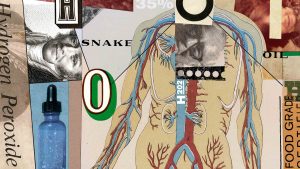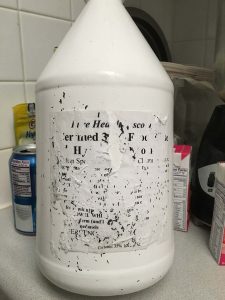DARYL KHAN was desperate when he first considered using concentrated hydrogen peroxide — more than 10 times the strength typically found in drugstores — to treat his wife Susan’s uterine cancer. Susan was diagnosed in 2010, underwent surgery and radiation, and thought she had it beat. But in October 2015, a recurring pain in her abdomen twice landed her in the emergency room. A few weeks later, doctors gave her the news no one wants to hear: The cancer was not only back, but it was spreading.
“They did the whole regimen thing that they do to everybody and it sucked, it really sucked,” said Khan, who says he has a deep mistrust of mainstream medicine. Susan was very sensitive to the medications she was given, he recalls. “She just kept getting worse and worse.”
Khan says he soon began combing the internet for alternative treatments, and eventually found several sites selling what was called “35 percent food-grade hydrogen peroxide.” Sites with names like Pure Health Discounts, Guardian of Eden, Jutrian RX, and more carried testimonials and detailed informational pages suggesting the use of the chemical to treat a dizzying array of ailments, from Lyme disease and skin problems to leukemia and even brain tumors. “There werelots and lots of testimonials for the fact that it worked on certain cancers,” Khan says.
“I was groping and struggling and searching,” he added through tears.
Khan was an easy target for internet marketers who promise health benefits from drinking just a few drops of hydrogen peroxide diluted in a glass of water. It’s a folk remedy that reaches back decades, and one that continues to flourish at the margins of alternative medicine, and in those corridors of the internet frequented by people who are desperate for a cure. Scientifically, there is no evidence supporting the practice as a remedy for anything — and ample evidence suggests that it can even be dangerous.
In 2011, for example, a 53-year-old woman ended up at Detroit Receiving Hospital after she drank 10 drops of high strength hydrogen peroxide as a “cleanse.” A year later, a 56-year-old man drank concentrated hydrogen peroxide hoping to treat his hives and ended up in the same emergency room. Both patients suffered from blockages in the bloodstream caused by hydrogen peroxide and would have died or likely been permanently disabled if not for the efforts of Dr. Brendan Byrne and a team of doctors who saved both patients with hyperbaric oxygen therapy, a treatment long used for scuba divers who surface too quickly.
“The ingestion of hydrogen peroxide, even in relatively small volumes,” said Byrne, now an assistant professor of emergency medicine at the University of Michigan Medical School, “can cause devastating complications.”
These aren’t the only cases where someone has been hospitalized or died. An analysis of cases reported to the National Poison Data System between 2001 and 2011 found nearly 300 cases of poisoning caused by the ingestion of high-concentration hydrogen peroxide, or about 30 cases per year. That number only includes cases identified by doctors and called into poison control centers. But Dr. Benjamin Hatten, a corresponding author of the study, said he suspects the actual number is higher. “I would say the real number is probably somewhere around 50 or so per year actually have problems from this,” said Hatten, who conducted the research while at Oregon Health and Science University and is now an assistant professor of emergency medicine at the University of Colorado School of Medicine.
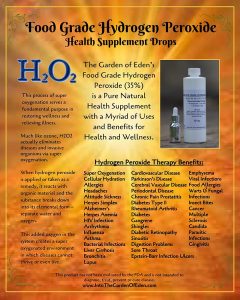
One online advertisement claimed food grade hydrogen peroxide “actually eliminates diseases and invasive organisms.” The list of ailments it can purportedly be used to address includes cancer, diabetes, and Parkinson’s disease.
Hatten said he’s aware of no well-done studies that suggest the ingestion of hydrogen peroxide is beneficial, and of the nearly 300 cases he has examined, 41 suffered life threatening embolisms — or bubbles in the bloodstream — as a result of ingesting the chemical compound. Twenty died or were left catastrophically disabled.
Yet despite the risks and public warnings by federal regulators, alternative health companies continue to market the chemical, claiming elixir-like powers, capable of curing a multitude of diseases. Concentrated hydrogen peroxide can even be found in certain health food stores, often next to salads and other prepared foods. Sometimes bottles are sold with pamphlets stating that hydrogen peroxide should not be applied directly to the skin — but those same brochures also give suggested dosages for internal use.
In theory, 35 percent hydrogen peroxide can be diluted in water to bring it to roughly the 3 percent concentration that’s typically sold in drugstores as a mild antiseptic for minor scrapes and cuts, or as an oral rinse. And according to the American Association of Poison Control Centers, accidental ingestion of small amounts of this low concentration is unlikely to cause more than some temporary discomfort.
The problem is that ordinary consumers — nudged by dubious marketing into believing that ingestion holds curative potential — are able to purchase the much more concentrated versions of hydrogen peroxide by the gallon, and without any clear instructions for measurement or dilution. Solutions containing more than 10 percent hydrogen peroxide are not typically associated with home use — and for those above 12 percent, the Illinois Poison Center advises consumers on its website: “Don’t buy it! Don’t try it! Don’t bring it in your house! End of discussion.” The agency considers the product so dangerous that all calls for hydrogen peroxide ingestion above 12 percent are “immediately referred to the nearest emergency room for treatment.”
(It’s not just health officials who are concerned. Concentrated hydrogen peroxide is considered a “chemical of interest” by the Department of Homeland Security, a high-priority precursor chemical that can be used to build improvised explosive devices. The would-be bomber arrested in athwarted 2016 New York City terror plot was found to have ordered 40 pounds of the concentrated chemical. The U.S. Postal Service considers it a hazardous material and doesn’t accept shipments of hydrogen peroxide at concentrations higher than 20 percent. Officials in the U.K. have banned the sale of anything greater than 12 percent to individuals without a license.)
Daryl Khan, desperate to cure his wife’s cancer, purchased 35% food grade hydrogen peroxide from Pure Health Discounts. Photo by Daryl Khan, son of Susan Khan, June 5, 2016.
Earlier this year, the online retail giant Amazon implemented a new policy forbidding vendors who sell their products through its website from marketing hydrogen peroxide in concentrations higher than 12 percent. Still, one seller — Pure Health Discounts — continues to tout on its Amazon profile that it sells “as much as 100 tons of 35 percent food-grade hydrogen peroxide per month.”
Khan, like many seeking salvation from cancer and other afflictions, said he didn’t know about any of the warnings. His eldest daughter helped him order his 35 percent hydrogen peroxide online from Pure Health Discounts, and he says that at the time, he considered it a reputable company. “She got a gallon, a big thing. I don’t know if we really needed it, you just use drops, you know, you increase the drops every day,” said Khan, who gave it to Susan in her water. “She would take it and get a kind of acid-reflux initially, so you get like a throw-up reaction.”
Khan said he never expected she’d feel better immediately, but hoped the regimen would help long-term. It didn’t, and Susan died less than a year after learning her cancer returned.
Looking back, Khan said he doesn’t think the elixir contributed to Susan’s death, but the couple’s eldest son, also named Daryl, isn’t so sure. Now a college journalism professor living in New York, he says he was alarmed when he found out about the hydrogen peroxide. “She didn’t like the way it tasted and she was particularly sensitive already from the chemo — nothing tasted good,” said the younger Khan, who worried the hydrogen peroxide would interfere with chemotherapy, a concern he said was shared by his mother’s doctor.
“It was in a big jug-handled transparent bottle, the kind of thing you’d imagine bouncing around in your trunk the way antifreeze or windshield washer fluid would,” said the younger Khan, who was furious to learn that the individual who sold the chemical to his family has been on the FDA’s radar for more than a decade.
“It’s hard to fathom the level of grubby exploitation you’ve reduced yourself to, to turn a buck off of people who are watching their loved ones die in slow-motion over the course of a year or whatever it may be,” he said. Of dumping out the hydrogen peroxide he found that his father kept in the refrigerator, Khan said, “I won’t say it wasn’t without some glee to do it — to dump out poison that these total snake oil salesmen are selling.”


(1) The Khan family long before Susan, right, developed uterine cancer in 2010. Desperate to help her, Daryl Khan, center, found websites peddling the curative power of food-grade hydrogen peroxide. Visual: Courtesy of Daryl Khan (2) Here, Khan looks through old photos of Susan. He had hoped the regimen would help, but it didn’t, and Susan died less than a year after learning her cancer returned. Visual: Karen Savage for Undark
DISCOVERED BY Louis-Jacques Thenard in 1818, hydrogen peroxide has two hydrogen atoms and two oxygen atoms — a composition similar to that of water, but with an extra atom of oxygen. Mainly produced in large-scale facilities, it’s sold in solutions of varying strengths or concentrations and labeled by percentage. The percentage refers to the amount of hydrogen peroxide in the solution — the rest is water. Stabilizers are often added to minimize decomposition and increase shelf-life.
At lower concentrations — typically between 3 and 10 percent — hydrogen peroxide has long been used to disinfect scrapes and cuts (though many health care professionals now recommend against it) and can be used as a cleaning solution. It can be used cosmetically to lighten hair and whiten teeth. Higher concentrations can be used in wastewater treatment and as an alternative to chlorine in pools. Extremely high concentrations can be used as rocket fuel.
An oxidizer, hydrogen peroxide alone is not combustible, but it can promote the combustion of other materials. Particularly when heated, it can provide fuel to fires by rapidly releasing oxygen.
Those who promote hydrogen peroxide as an alternative health remedy usually refer to it as “35 percent food-grade hydrogen peroxide,” but this labeling can be misleading. According to the FDA, there is no official definition for the term “food-grade.” While the nonprofit U.S. Pharmacopeial Convention, in collaboration with the agency and other groups, publishes specifications for hydrogen peroxide used in food packaging and processing, the chemical is not intended for ingestion. But it’s the release of oxygen that those who advocate the ingestion of hydrogen peroxide mistakenly believe is beneficial. The theory — which has not been proven — is that degenerative diseases are caused by a lack of oxygen in the tissues that allows toxins and harmful bacteria and viruses to accumulate.
Proponents say introducing hydrogen peroxide into the body will increase oxygen levels and ward off ailments — essentially a low-budget form of oxygen therapy.
Dismissed by most mainstream health care professionals, the use of the chemical internally for medicinal purposes was reportedly first considered in the early 1900s, when hydrogen peroxide was said to have cured pneumonia in post-World War I India. In the 1940s, proponents say, Father Richard Willhelm, who referred to hydrogen peroxide as “God’s own immune system,” furthered interest in the chemical, when he promoted the use of hydrogen peroxide as a deterrent to skin diseases, polio, and mental illness.
Proponents also often point to the work of Dr. Otto Warburg, a Nobel Prize-winning scientist who they allege found an association between cancer cells and low oxygen levels. Cancer researchers counter that Warburg found no such association and that the ingestion of hydrogen peroxide is not likely to increase oxygen on a cellular level.
Doctors who treat those who’ve ingested the chemical say the rapid release of oxygen can be deadly. “Hydrogen peroxide at any concentration, if drank, reacts with a natural enzyme in the body — catalase — and produces very high volumes of oxygen,” said Byrne. “That oxygen has to go somewhere and the volume is so high that you physically can’t just burp it out. It crosses the membrane of the GI tract into the blood vessels and those resultant bubbles block up the blood vessels, leading to heart attacks, strokes, and other complications.”
Like Hatten, Byrne said he suspects many cases of hydrogen peroxide poisoning are never identified. “The cases I wrote about are not as isolated as they would seem — the question is, do people recognize them,” said Byrne. “Those complications are a very rare set of complications that can be easily mistaken for something else, and people cannot get treatment for them because doctors think it’s something else.”
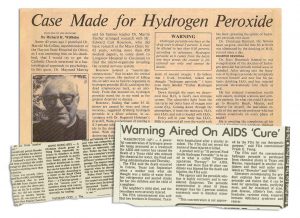
The idea that ingesting diluted hydrogen peroxide has curative powers reaches back decades. In the 1980s, the FDA warned against its use to cure AIDS.
Not everyone who ingests high strength hydrogen peroxide does so intentionally. A 74-year-old man in Tennessee drank what he thought was water from a pitcher in his daughter’s refrigerator. He was hospitalized and put on an intravenous proton pump inhibitor, a medication typically used for people with severe stomach ulcers and stomach acid. Tests showed he suffered damage along his esophagus and stomach.
In another case, a four-year-old accidentally drank concentrated hydrogen peroxide that his father used as an alternative cure for digestive problems. Within minutes, the boy cried out with excruciating abdominal pain and soon lost consciousness. Several years later, he was still plaguedwith seizures, unable to eat or walk on his own. A two-year old girl in Italy fared even worse. While visiting a dairy farm with her parents, she became thirsty and took a drink out of a transparent container that resembled a water bottle. It contained hydrogen peroxide for milk preservation and she soon grew confused and her breathing grew labored. She later died from breathing issues due to the hydrogen peroxide ingestion, which caused “severe chemical aspiration pneumonia, pulmonary emphysema, esophagitis, and gastritis.”
Despite such stories, advocates for ingesting hydrogen peroxide abound. Ed McCabe, a lecturer and author of the book “Flood Your Body With Oxygen,” said that for intentional users, it’s all about the protocol. McCabe, who says he has used hydrogen peroxide himself and is often referred to as “Mr. Oxygen,” said that when used correctly, the chemical will only oxidize or attack unhealthy cells and pollution in the body. But he noted that the 35 percent solution must be properly diluted and blames most ill-effects on improper usage.
“It’s the lack of education about these things because they won’t teach it in medical school, that’s the problem,” McCabe said. “If anybody ever dies or whatever, I can just assure you that the human body loves oxygen in the right way in the right amount of time, and if anything other than that happens, somebody’s doing something wrong.”
But Byrne warns that even one sip of the high concentration solution can cause severe health consequences.
“If any of my friends decided to tell me they were doing this, I’d tell them that it’s my belief that the risks far outweigh the benefit,” he said.
THE HEALTH NUTS, a chain of New York City-area health food stores, carries “35 percent food-grade hydrogen peroxide” called Oxy-tech. The bottle says you can “stimulate and invigorate your body inside and out with Oxy-tech” and includes the chemical’s United Nations dangerous goods number — UN2014 — along with a warning not to swallow it. No other information is provided.
At one location, concentrated hydrogen peroxide is displayed in a refrigerated case, along with prepared salads and pickles. Sudhangshu Roy, a manager at the Upper East Side location, said customers buy “quite a lot,” but declined to speculate what they use it for. “We are only the retailer — we recommend customers consult their doctors or health professionals before using any health products,” said Roy, who said he’s worked at The Health Nuts for more than 20 years.
At another location, Oxy-tech is stored in a secured refrigerator, and employees must retrieve the product when requested by customers. Along with the hydrogen peroxide, purchasers are given a thin blue pamphlet that includes a dosing chart listing how many drops to dilute in water when using internally. “You can wash your clothes with this product, you can soak your toothbrush in a small amount to kill bacteria, you can clean surfaces, and you can also drink it,” said Ellington Campbell, who’s worked at The Health Nuts’ Upper West Side location for nearly 30 years. Campbell said customers use the product for “detoxing the system,” for “a healthy immune system,” and to “help with friendly bacteria.”
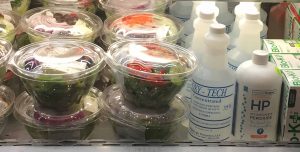
At some health food stores, 35 percent hydrogen peroxide solutions are sold on shelves next to salads and juices. Visual: Karen Savage for Undark
He added a warning: “If you drink it like this you will melt all your organs,” Campbell said, pointing to the brochure, “so you follow these directions, the dosage, you read that.”
The company behind Oxy-tech, ME2Eagle Enterprises, LLC, is based in Whitney, Texas. During a phone interview, Chris Wood said her mother and step-father set up the business and started selling Oxy-tech about 20 years ago. “They were always in the chemical business,” said Wood, who added in a call last week that the fate of the company is uncertain following her mother’s passing earlier this month. She said that after governmental agencies enacted stiffer regulations on the chemical industry, her family struggled financially.
It was during that time that her mother learned about hydrogen peroxide and realized there was money to be made. “Mom said it was an answer to a prayer because [financially] they were pretty much on their last leg and she started doing research on this and found out more about it,” said Wood, who couldn’t say exactly how much they sell per year, but confirmed the company distributes the chemical to retailers around the country, including The Health Nuts stores in New York.
Wood said customers use the product for many things, including washing laundry, in marinades, and for hydroponic gardening. When diluted, she added, it can be used in enemas, douches, and baths. Poultry that has ingested the product, Wood asserted, can be considered “organic.”
Wood says she believes many doctors are opposed to hydrogen peroxide because they are “sleeping with the pharmaceutical companies.”
“Well, if, let’s see, if everybody was on peroxide and being healthy and didn’t go to the doctor, well then what?” said Wood.
She described most of ME2Eagle Enterprise’s hydrogen peroxide customers as elderly, and she talked at length about those who she says have used the product for cancer, sores, West Nile virus, and parasites. For each malady, Wood — who according to state records is not licensed to practice medicine or dispense medication — described seemingly miraculous results. When asked if she knew the FDA’s position on hydrogen peroxide, Wood responded: “That I don’t know.”
She said ME2Eagle Enterprises has two employees and has never dealt with the FDA.
“It’s still a mom and pop business,” she said. “We don’t want to get too damn big because then they will start coming down on you.”
THE FDA became concerned about hydrogen peroxide in the 1980s, when companies marketed high-strength versions not only to people with cancer and other ailments, but also to those with AIDS. Charged with regulating the accuracy of medical claims, the FDA found the chemical to be anything but miraculous. In 1989, after reports of several injuries and at least one death, the FDA advised the public not to use the chemical internally and warned that it can cause serious harm or death. In 2006, another warning was issued, reiterating that the product “can cause serious harm or death when ingested.”
“No one has presented any evidence that hydrogen peroxide taken internally has any medical value,” said Dr. Steven Galson, then-director of the FDA’s Center for Drug Evaluation and Research, in that warning. “In fact, consuming hydrogen peroxide in the manner touted by these websites could lead to tragic results.”
Since 2006, when Galson and the FDA warned about the ingestion of the chemical, incidents of hydrogen peroxide poisoning have become increasingly well-documented in the scientific literature.
“When these things go bad, they go bad very suddenly,” said Dr. Eric Lavonas, a toxicologist with the Rocky Mountain Poison and Drug Center who has treated patients who have ingested hydrogen peroxide.
“I don’t recommend or see the value of taking it at all,” said Lavonas, adding he’s not aware of the chemical having a proven role in the treatment of any disease.
Lavonas said most people who use high strength hydrogen peroxide dilute it down so it’s not high strength by the time they ingest it — and many proponents of the practice argue that failure to do so is the customer’s fault. But there is little standardized information attending the murky hydrogen peroxide health market, and recipes for dilution, ratcheting up intake, and other “instructional” advice is often ad hoc, contradictory, and cobbled together on marginal websites or in low-budget books. Asked during a phone call why her mother’s company sold 35 percent hydrogen peroxide, rather than the typical household concentration of 3 percent, Wood of ME2Eagle Enterprises in Texas had a ready response: “Well at 3 percent, if they were going to do it internally, it wouldn’t work,” she said.
In general, Lavonas confirmed that problems arise when people take either a little of the high concentration version without diluting it, or a larger amount of the diluted solution found at drugstores. “Where it’s dangerous is when you’re dealing with the really potent version or if you drink large amounts of the regular stuff,” he said, adding that most toxicologists and hyperbaric doctors have seen several patients who’ve ingested the chemical.
“When hydrogen peroxide hits stomach acid, it makes bubbles. Those bubbles are oxygen gas. The highly concentrated hydrogen peroxide — a tablespoon of 35 percent hydrogen peroxide — hits your stomach and suddenly releases one and a half liters of gas, which is enough to fill the stomach very quickly, then over fill it and the gas has to go somewhere. If you’re lucky, you belch it up. If you’re unlucky, it forces its way into the blood vessels,” said Lavonas.
Arteries don’t have valves, so once the bubbles are in the arteries, they rise to the brain and can lead to stroke. If this is suspected in a patient, Lavonas said emergency room doctors will order a CAT scan — if it reveals blood vessels that are full of air instead of blood, the diagnosis is confirmed.
“Some people get lucky and have minor symptoms and you just need to treat the symptoms,” Lavonas said. “I’ve also treated people who have had air get as far as the blood vessels around the intestinal tract and the liver but not get up to the brain and those people generally recover pretty well. The liver is a much more forgiving organ than the brain when it comes to things like that.
“But you know, what’s the difference?,” he continued. “Three people take exactly the same two tablespoons of peroxide, one just belches and gets nothing, one of them gets air into the liver and recovers great and one of them has a stroke or dies. You can have a stroke big enough to be fatal, you can have bubbles get into the heart and cause a heart attack and the problem is, you just don’t know going into it whether you’re going to be the guy with good luck, medium luck, or bad luck.”
For its part, the FDA has issued official warning letters telling individuals to immediately stop promoting and selling the chemical to prevent, treat, or cure ailments. One recipient, contacted by the FDA as far back as July 2006, was Mark Ovard, based at the time in Wolfe City, Texas. In the letter, FDA officials cited several violations on one of Ovard’s websites for marketing an unapproved drug and making false and misleading statements about the product. Ovard was instructed to correct the violations within 15 working days, or at least provide an explanation as to why he would be unable to do so.
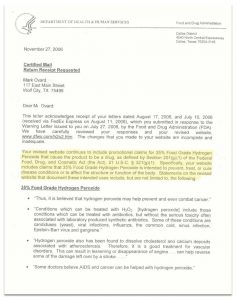
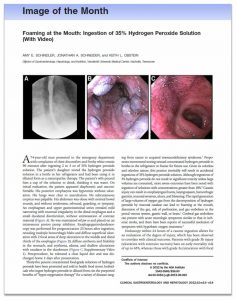
The FDA warning letter issued to Ovard in 2006. More than a decade later, his websites still appear to flout the agency’s warnings. The full letter can be seen here. A 2012 paper published in the journal Clinical Gastroenterology and Hepatology looked at the internal damage done in a case of accidental ingestion of high-grade hydrogen peroxide.
According to FDA spokesperson Lyndsay Meyer, warning letters often persuade companies to voluntarily comply with federal regulations. The agency’s next steps depend on the recipient’s response.
Documents obtained through a Freedom of Information Act request show Ovard disputed the charges in the warning letter. He made slight changes to his website, adding information about diluting the concentrated chemical, and a statement that content on the site was for informational purposes only and had not been evaluated by the FDA. In a follow-up letter sent three months later, the FDA said the changes were not good enough.
“Regardless of whether your website includes such disclaimers, it continues to promote your 35 percent hydrogen peroxide product to prevent, treat, or cure disease conditions,” wrote then-FDA Dallas District Director Michael Chappell in November 2006. The FDA again told Ovard to immediately correct violations or face penalties, including possible criminal prosecution.
The Texas State Board of Pharmacy and the Texas Department of State Health Services both received copies of the November 2006 letter, but neither state agency appears to have taken any action. Gay Dodson, executive director of Texas State Board of Pharmacy, said that because Ovard is not a licensed pharmacist and doesn’t own a pharmacy, any action at the state level would have been the responsibility of the Texas Department of State Health Services.
A spokesperson for the Texas Department of State Health Services acknowledged that the department has jurisdiction for such violations, but could find no documents to indicate it took any action against Ovard or his website. But according to a 2007 internal investigation memo, FDA Investigator Connie Hannon-Rabel attempted to visit Ovard the following summer.
In the memo, Hannon-Rabel wrote that she traveled to Wolfe City, a town of 1,400 northeast of Dallas and attempted to meet with Ovard. Once there, she learned from locals that Ovard and a female companion — some of whom referred to the couple, along with another man, as “the hydrogen peroxide people” — “had been gone for approximately 4 to 5 months.”
Wolfe City residents told the investigator that Ovard and his companion had several sports cars and recalled a “fancy carriage” used for weddings. In addition to selling hydrogen peroxide, Ovard, who describes himself as an ordained minister and retired judge, also advertises non-traditional wedding services on one of his websites.
Hannon-Rabel’s memo indicates at least one Wolfe City resident was concerned about 50-gallon containers of 35 percent hydrogen peroxide that were frequently delivered to Ovard by a truck labeled with “hazardous” placards. After the futile trip to Wolfe City, the investigator eventually contacted Ovard by phone. He refused to meet with her, but in a phone call on August 16, 2007, he asked what needed to be done to get “the FDA off his back?”
According to the memo, Hannon-Rabel again explained the FDA’s concerns. Ovard promised to make the required changes within three days, which he failed to do. On August 20, 2007, Hannon-Rabel tried to call him, but to no avail. Hannon-Rabel then notified an FDA compliance officer, who suggested she should give him more time, but added that the agency “is not prepared to support any further regulatory action.”
FDA documents show that although Ovard did not make the required changes, he did respond to the agency with long, often rambling letters. One threatened legal action against the agency and another theorized that there are some who believe that “you are the evil FDA out to kill them.”
In one letter, Ovard wrote:
“The more you write — or I write — that the FDA opposes my products, the more little-knowledge customers it will draw. If you know anything of the mindset of many involved in seeking alternative health care — either in desperation, personal beliefs, or lack of funds for traditional health care — you would accept what I am attempting to explain.”
AFTER UNDARK began asking questions about the practice, many websites, along with vendors on Amazon, have removed overt references to using hydrogen peroxide internally. But others — including intothegardenofeden.com — continue to market the chemical as a health supplement, promoting it as a remedy for HIV, shingles, syphilis, cholera, cancer, multiple sclerosis, and more.
Also still active are the “hydrogen peroxide people” — Mark Ovard and his companion, Rene Hovious. They now operate out of Crystal River, Florida, a quiet city about an hour and a half north of Tampa, and they are associated with a network of companies and websites that sell high strength hydrogen peroxide, including Pure Health Discounts, DFWX, Guardian of Eden, Trinity Nutralab, Jutrian RX, Pure H202 For Health, and Celeste Pure H202 For Health.
Hovious — who is sometimes identified under a variety of different last names — processes incoming orders from an office perpetually decorated for Halloween. During a February visit, a one-eyed skeleton sporting a top hat and Mardi Gras beads watched over Hovious and three other women who worked alongside her in the tidy office.
Hovious’ desk faces a second skeleton, this one resting on a massage chair, a pirate hat perched on its bony head. A giant stuffed spider hangs from a back wall. Under the spider, white bins on a large rack are neatly labeled with names of companies – G.O.E, for Guardian of Eden, Pure Health Discounts, Jutrian RX, Celeste, and others.
Hovious declined to elaborate, but said most of the 35 percent hydrogen peroxide sold comes through the many companies associated with the couple. “We sell to a lot of people — most everything out there comes from us,” she said, adding that hydrogen peroxide is getting more and more popular. A good deal of the hydrogen peroxide they sell is used as a replacement for chlorine in pools, for washing clothes, and cleaning, Hoivous said, but she also said the food-grade solution can be consumed. “It’s a good product, it depends on the people and what they are using it for — as long as you do your research, it will be beneficial,” she said, adding that anyone not familiar with the product should get some and will quickly see the benefits.
“Dosage depends on your doctor’s advice,” she said.
“We can’t give medical advice, we just sell the product,” Hovious added.
Here, the co-founder and director of a Texas eco-village, Quinn Eaker, explains the purported science underpinning hydrogen peroxide’s curative powers when ingested. It has been viewed more than 100,000 times.
About three miles down West Gulf to Lake Highway, situated between a shopping plaza and a landscaping company, a run-down warehouse serves as a storage and distribution center for Ovard and Hovious. Peggy Melchiore, owner of the landscaping company, said she doesn’t know much about what her neighbors do in the warehouse, but has heard it involves hydrogen peroxide. She said Ovard’s business moved in a few years ago after a fire destroyed his previous warehouse.
From just outside Melchiore’s office, black 55-gallon drums with the familiar number — UN 2014 — can be seen through large open doors of the warehouse. While she feels confident her business is a safe distance away, Melchiore noted the chemical could cause an explosion or fire and said big rigs frequently make deliveries to a side door of the warehouse.
On a recent afternoon, an 18-wheeler from Brenntag, a German-headquartered chemical distribution company that also operates in North America, delivered more than a dozen blue drums of hydrogen peroxide, hauling away about the same number of empties from a previous delivery. Windows on the building are covered over in dingy paper and an old ambulance and several other vehicles dot a parking area. A knock on the front door of the warehouse is quickly answered by young man named Bryan.
Just inside the door, three men and one woman worked to slide white gallon jugs labeled “35 percent food-grade hydrogen peroxide” into plastic bags, then into cardboard shipping boxes. About 20 one-gallon jugs of the chemical sat on a large portable cart in the middle of the room.
In 2012, Guardian of Eden, a company associated with Ovard and Hovious, was fined more than $13,000 by the U.S. Department of Transportation’s Pipeline and Hazardous Materials Safety Administration for failing to properly package shipments of concentrated hydrogen peroxide. Bryan disappeared through a door in the back, returning a few minutes with Mark Ovard, who quickly, but politely ushered me outside.
Ovard said high-strength hydrogen peroxide has many uses and a lot of customers buy the product for taxidermy and in place of chlorine for pools. He acknowledged having a “dispute” with the FDA years ago and said he changed the language on his website and added warning labels.
“I can tell you it’s non-toxic, there’s nothing toxic in it, but once it goes into health, we can’t say more,” said Ovard when asked about the chemical’s health uses. “We give what we think is a safe level of usage as far as consuming it,” said Ovard, warning that the product could cause harm if not properly diluted.
He declined to say how much hydrogen peroxide he sells per year, but said when it gets to be too big, the FDA gets involved.
“I sell a significant amount and I wish I sold more,” said Ovard.
When reached last week, Ovard insisted that his products are not marketed for internal use, though his sites offer bottles as small as 4 ounces, advertised alongside a list of books including “True Power of Hydrogen Peroxide: Miracle Path to Wellness” and “Hydrogen Peroxide: Medical Miracle.”

Ovard insisted last week that his products are not marketed for internal use. But that assertion is difficult to square with the dropper bottles of the solution for sale on his website, alongside books that tout the health benefits of ingesting hydrogen peroxide.
DR. STEPHEN BARRETT, a retired psychiatrist and founder of Quackwatch, has been following health-related frauds and misconduct for decades. He said that to market a product online, all that’s needed is a relatively inexpensive website, a hosting service, and a way to drive customers to the site. “That’s one of the reasons I think there are so many websites that are selling products that won’t do you any good,” said Barrett.
Barrett’s point is illustrated by Google’s advertising service, Google Ads. Sign-up is free and customers are only charged when someone engages with their ads, say by watching a video or visiting a website. According to Google policy, “Herbal and dietary supplements with active pharmaceutical or dangerous ingredients” are prohibited.
Nonetheless, until recently, an ad for a website associated with Ovard — Pure Health Discounts — came up at the top of a Google search. “We are investigating this issue and any ads that violate our policies will be removed,” a Google spokesperson said when asked by Undark if such ads complied with Google’s policies. A source at Google later confirmed that 35 percent hydrogen peroxide would be added to the company’s list of prohibited pharmaceuticals and supplements.
Barrett, meanwhile, said no regulation or policy will be effective until the sale of questionable products is no longer profitable.
Prescription and over-the-counter drugs are evaluated by the FDA for safety and effectiveness prior to sale, and they can only be marketed for the specific conditions they have been proven to treat. If they judge it to be medically appropriate, doctors also have some latitude to legally prescribe drugs for so-called off-label uses. The ingestion of hydrogen peroxide, however, has not been approved by the FDA to cure, treat, prevent, or mitigate any disease, so vendors who market hydrogen peroxide for ingestion — or with claims that it can cure or prevent cancer, AIDS, or other ailments by whatever means — are in violation of FDA regulations and they risk criminal prosecution.
Even so, it’s easy to find examples of sellers flouting the law. While the FDA’s Lyndsay Meyer could not comment on specific examples of marketing materials for food-grade hydrogen peroxide found online, she reiterated that it “should not be marketed or sold for human consumption or internal administration.”
“The FDA has never approved high-strength hydrogen peroxide to be taken internally and considers hydrogen peroxide at 35 percent strength dangerous,” Meyer wrote in an email.
Nonetheless, the odds of prosecution for these sorts of violations are slim.
“If someone is confronted with an FDA warning, they can make small changes and hope to stall it off, they can do nothing and hope that the FDA won’t go any further, they can calculate the odds — and they also know that if the FDA does go further, there may not be a financial penalty at the end,” said Barrett.
Stopping the sale of dangerous products often takes years. Ephedrine, once marketed for helping with weight loss, increasing athletic performance, and increasing energy, was finally banned by the FDA in 2004 after years on the market. Despite the ban, supplements made from the rest of the Ephedra plant from can still be online.
MMS is a toxic chemical marketed illegally as a drug to cure cancer, AIDS, malaria, and more. After pushing the product as a miracle cure for years, a Washington State man was convicted in 2015 of various charges related to selling the solution — which is a mixture of water and a chemical used as a pesticide and for hydraulic fracking. The following year, an ABC News investigation revealed the chemical was being marketed as part of a scheme by a fringe church. Despite the conviction and a shining national spotlight, MMS, too, can still be purchased online.
Of the 600 companies Barrett says he’s reported to the FDA for marketing violations, he doubts if even a few dozen have received letters warning them to stop.
Because the agency doesn’t pursue a lot of criminal cases, he added, companies “don’t have a lot to lose by defying the FDA.”
OVER THE LAST several months, a page on the Pure Health Discounts site filled with customer testimonials touting the benefits of using 35 percent hydrogen peroxide to treat things like Epstein–Barr virus, Lyme disease, warts, and skin cancer has been removed and then re-posted. As of this writing, the page is back online (a PDF of the page as it appeared on August 19 can be viewed here). By publishing such testimonials, Pure Health Discounts appears to be violating FDA regulations, and the agency has issued warning letters to vendors of other products for posting similar testimonials.
Meyer declined to comment on specific sites connected to Ovard and Hovious, nor would she say whether any of the currently public pages comply with FDA regulations. Still, in an email message, she said that in general, “products that claim to cure, treat, prevent, or mitigate diseases despite not having been proven safe and effective for those intended uses would make it an unapproved new drug and a violation of the Federal Food, Drug, and Cosmetic Act.”
Meyer said FDA policy also prevents her from saying if her agency is currently monitoring the couple’s websites, but she said forcing individuals like Ovard and Hovious to comply with federal regulations can be frustrating. “They just stop and change their address or change their labeling and their company and then we’re back at square one, because now it’s a different company — and that’s if we can find them,” Meyer said, adding that when that happens, the process has to start all over again, even if the same individual is behind both companies.
“That’s one of the greatest challenges,” Meyer said, noting that the agency has limited resources and must target investigations carefully. Products that are regulated by the FDA make up some 20 percent of the nation’s consumer spending, Meyer noted, and yet the FDA receives an average of only $8 a year from each U.S. taxpayer. “The issue here with the small companies is that they’re a lot more nimble,” she said — adding that while smaller companies have more violations, it’s often more difficult to hold them accountable.
The vexing realities of this fringe marketplace and the challenges of regulating are not lost on Susan Khan’s son.
“What would happen if Dow was selling this? If Bayer was selling this? If doctors were getting paid by them to recommend it?” he asked. “It would be a monumental scandal.” The younger Khan remains convinced that the ingestion of hydrogen peroxide hastened his mother’s death and robbed them of precious time together. He also argues that while the desperate and uninformed can be easily duped, most people find the idea of ingesting a concentrated, caustic chemical so far-fetched that it’s easy to discount the marginal peddlers who make money off the gullible.
“The fact that they’re scummy, slimy people — it’s giving them, weirdly, this paradox, this protection because no one’s taking them seriously,” Khan said.
“They’re treating them like carnival barkers and no one cares about going after a carnival barker,” he added. “But imagine if the carnival barker was poisoning people.”
Karen Savage is an investigative journalist with a special interest in environmental justice and the effects of science on individuals, families and communities.
UPDATE: An earlier version of this story incorrectly implied that Amazon had changed its policies regarding sales of 35 percent hydrogen peroxide following questions from the writer. The retailer updated its policy earlier this year, prior to initial contact from Undark. The piece also incorrectly described a proton pump inhibitor as a machine. It is a medication.
Top visual: Tim Robinson for Undark
Sign up for the QuackTrack.org newsletter below!














